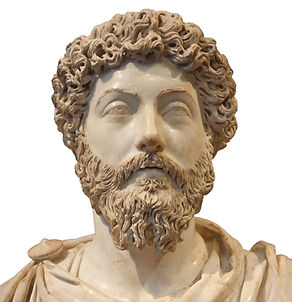StoicSpirit
The Roman Influence
Much of what we know about Stoicism is a result of existing Roman text. The Romans would focus on ethics - how to live a good life - the very heartbeat of Stoic philosophy.
These Stoic texts have many practical life lessons that are as relevant today, as they were two thousand years ago. Stoicism helps individuals build character, mental stamina and resilience: personal attributes that contribute to a stronger, more cohesive community where tolerance thrives.
The Roman Influence
Much of what we know about Stoicism is a result of existing Roman text. The Romans would focus on ethics - how to live a good life - the very heartbeat of Stoic philosophy.
These Stoic texts have many practical life lessons that are as relevant today, as they were two thousand years ago. Stoicism helps individuals build character, mental stamina and resilience: personal attributes that contribute to a stronger, more cohesive community where tolerance thrives.
Who's who in the Roman panoply of Stoic Philosophers
Rome offers an impressive array of stoic philosophers, including an aristocratic statesman, a slave turned philosopher, and an emperor that could be described as Rome's equivalent to a "philosopher king".


A prolific writer and statesman, Seneca penned Letters to a Stoic, as well as essays on happiness, mortality and anger. In his letters to Lucillus, he shared stoic principles and advice for living a good life. Sadly, Seneca's life was not without plenty of contradiction. He was obligated to provide tutoring and advice to one of Rome's worst emperors: Nero. Despite his best efforts to do so, Seneca failed to impart stoic values and virtues to the despot Nero.
In the end - accused of treason - he was forced to commit suicide. But, as the story goes, he did so in a clearly stoic fashion: meeting death calmly, without fear.
Another famous stoic was Epictetus. Born into slavery, he was allowed to study philosophy under the tutelage of another Roman stoic, Musonius Rufus. Sometime after the death of Nero, Epictetus was granted his freedom and went on to lecture on the principles and practical application of stoic philosophy. One of his students wrote meticulous notes of his lectures which were collected in a lengthy compilation called The Discourses of Epictetus. He also compiled a handy little notebook of Epictetus' most popular aphorisms: The Enchiridion (Handbook).
So popular were the teachings of Epictetus that they would be referenced often by one of Rome's greatest emperors - Marcus Aurelius - in his own collection of stoic thought and observation: known now as The Meditations of Marcus Aurelius. The Mediations were never meant to be published. They were like a personal diary, written by Marcus over many years, at his imperial court and while camped at the battlefront defending the empire against foreign incursions.
These Stoic dissertations have enjoyed immense popularity throughout history and have contributed to the character, thought and actions of many people, including statesman, politicians, civil servants, philosophers, psychologists, doctors, teachers...and people like you and I.
What follows is a plain-language explanation of how to live a virtuous life; a life of tranquility, fulfillment and purpose...a good life.